 Petzlover
Petzlover Long Haired Chihuahua is originated from Mexico but Schnorkie is originated from United States. Long Haired Chihuahua may grow 7 cm / 2 inches shorter than Schnorkie. Both Long Haired Chihuahua and Schnorkie are having almost same weight. Long Haired Chihuahua may live 5 years more than Schnorkie. Long Haired Chihuahua may have less litter size than Schnorkie. Both Long Haired Chihuahua and Schnorkie requires Moderate Maintenance.
Long Haired Chihuahua is originated from Mexico but Schnorkie is originated from United States. Long Haired Chihuahua may grow 7 cm / 2 inches shorter than Schnorkie. Both Long Haired Chihuahua and Schnorkie are having almost same weight. Long Haired Chihuahua may live 5 years more than Schnorkie. Long Haired Chihuahua may have less litter size than Schnorkie. Both Long Haired Chihuahua and Schnorkie requires Moderate Maintenance.
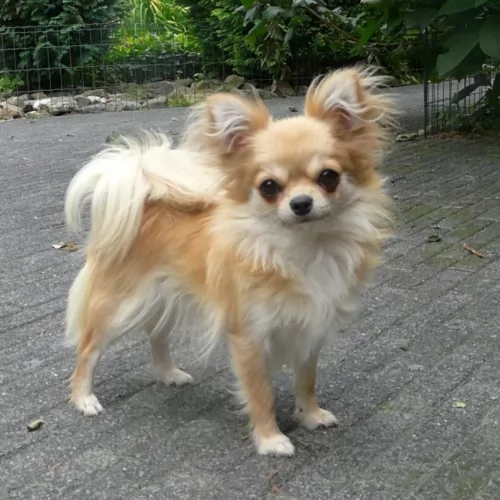 The short haired Chihuahua is such a recognizable dog breed, probably because of his tiny size, but did you know that you also get a long haired variety?
The short haired Chihuahua is such a recognizable dog breed, probably because of his tiny size, but did you know that you also get a long haired variety?
Looking quite a bit like a Pomeranian, the only difference between the two types of Chihuahua is the length of the coat.
This small dog dates back to Mayan times and while it may well have originated in Mexico, its popularity saw it becoming a sought after pet in other countries too.
To get the long haired Chihuahua, breeding programs were established and the short-haired variety was mated with other long haired toy sized dogs such as the Pomeranian and the Yorkshire Terrier.
 This dog is a cross between the Miniature Schnauzer and the Yorkshire Terrier.
This dog is a cross between the Miniature Schnauzer and the Yorkshire Terrier.
It’s not a purebred dog and is known as a designer dog. These dogs inherit characteristics from both of its purebred parents.
The origins and history of these breeds is often unknown with their being no records as to when or where breeders started developing them. This particular mixed breed dog originated in the United States.
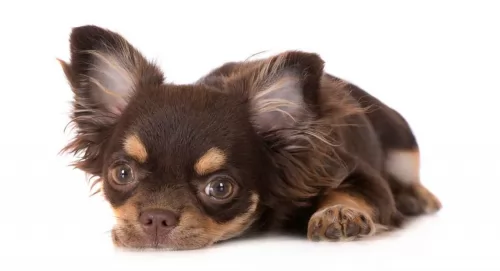 Your long haired Chihuahua will have a coat that is soft and slightly wavy. He weighs between 1 and 3kg and stands at about 15 – 23cm. He generally sheds throughout the year with a couple of heavier shedding periods during the year.
Your long haired Chihuahua will have a coat that is soft and slightly wavy. He weighs between 1 and 3kg and stands at about 15 – 23cm. He generally sheds throughout the year with a couple of heavier shedding periods during the year.
Don’t be fooled by the long, thick hair on the long haired Chihuahua as it doesn’t protect him from the cold – in fact he doesn’t tolerate the cold well at all, and is essentially an indoor dog. The ears are erect and feathery and the tail is full and plumed, lying over the back. He has a ruff on the neck, which is often described as a mane.
Chihuahuas are such bright-as-a-button little dogs and they’re intelligent too.
It’s difficult to say how a dog’s temperament will turn out, because breed, lifestyle and the type of owners can all make a dog a certain way.
Socialization and training can sometimes help with a dog that has bad genes. There are some people who say the Long haired Chihuahua is a nasty, aggressive little dog who’ll easily give you a nip but they’ve got a good reputation with many other dog lovers.
They love their own human family but may take quite a while to chill towards other people and other dogs too. They’re more ‘birds of a feather flock together’ type of dogs, preferring to get on with other Chihuahua dogs.
 The Schnorkie is a small dog standing at between 12 to 30cm in height and weighing just 3 to 6kg.
The Schnorkie is a small dog standing at between 12 to 30cm in height and weighing just 3 to 6kg.
Schnorkies have an athletic build but they are lean and you want to keep them that way.
Their double coat is mostly silky and straight, but can be wavy too. The double coat can be grey, silver, fawnish and have a mix of colors while also being available in solid colors.
The ears are half erect, half floppy and the tail tends to be medium length, plumed and held up.
Schnorkies are high spirited little dogs and they can also prove to stubborn. There is nothing that a bit of training and socialization won't do for stubborn dogs, making them obedient and responsive to their owners.
Because they are hybrid dogs, they can inherit temperaments or looks from either of the parent dogs.
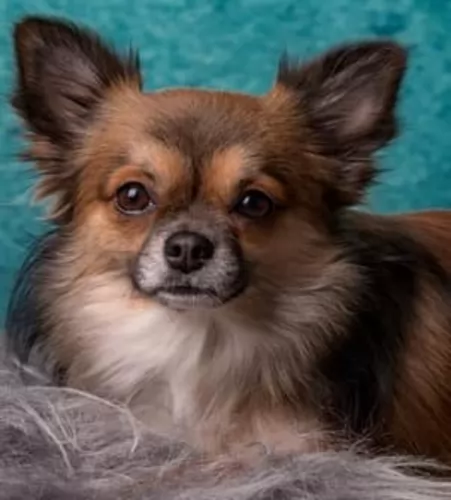 The Chihuahua is such a feisty, courageous, confident little dog who also believes that he is part- lion. He is loving, sweet and gentle and just loves being picked up and petted non-stop. He looks up at you, moving his front paws up and down to tell you that he wants to be picked up.
The Chihuahua is such a feisty, courageous, confident little dog who also believes that he is part- lion. He is loving, sweet and gentle and just loves being picked up and petted non-stop. He looks up at you, moving his front paws up and down to tell you that he wants to be picked up.
He is in 7th heaven when he can be cuddled up in your lap. You just have to teach your children to be very careful with him and not enter into games with him that are too rough and tumble. Tiny he may be but he makes a great watchdog too, barking and alerting you to strangers.
His small size makes him perfect for life in the city or in the countryside. Just be careful when in the countryside lest an Eagle or Owl scoop him up and carry him off to some faraway nest.
He doesn’t need a great deal of exercise either and you can actually keep him happily busy with some games indoors. He’ll always welcome walks with you though.
This small dog is full of life and confidence and he is ready to be your constant, loving companion.
 Your Schnorkie is a jaunty little dog who is going to love playing games with you. Children will need to treat him with gentleness and respect simply because he is small.
Your Schnorkie is a jaunty little dog who is going to love playing games with you. Children will need to treat him with gentleness and respect simply because he is small.
He is social, friendly and loving with his human family, though sometimes, coming from the Schnauzer, he gets a bit moody.
He makes a great family pet though and and while he loves to be outside playing, he also loves to come indoors and be everybody’s lap dog for the evening.
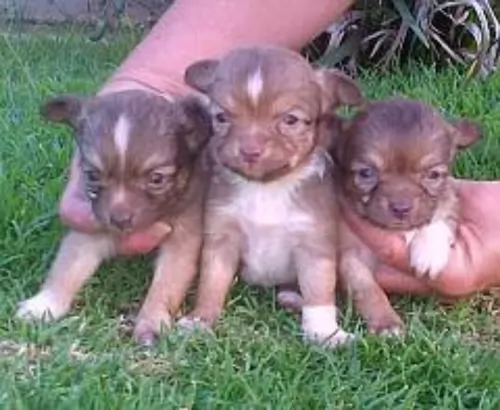 With good care, you’ll have your long haired Chihuahua with you for a long time – 15 years and longer.
With good care, you’ll have your long haired Chihuahua with you for a long time – 15 years and longer.
Make sure to de-worm your Chihuahua. Worms and other parasites can be deadly for your pet and the vet will do preventative deworming on a regular basis.
You Chihuahua will need to be vaccinated when he is a puppy and even when he is an adult, although less often. These vaccines will protect your Chihuahua from the likes of parvo, distemper and rabies. Have your chihuahua spayed or neutered.
There are so many puppies in the world who can’t find homes. Desexing your Chihuahua is a responsible way to ensure your pet doesn’t have puppies. Spaying and neutering can actually be beneficial for your dog’s health.
 Your Schnorkie, as a hybrid breed, can inherit some health problems from either parent – the Schnauzer or the Yorkshire Terrier.
Your Schnorkie, as a hybrid breed, can inherit some health problems from either parent – the Schnauzer or the Yorkshire Terrier.
Then again, mixing pure bred dogs can eliminate some common dog ailments. Overall, the Schnorkie is a healthy dog and can live up to 15 years of age.
A couple of major health concerns with the Schnorkie are dental problems and pancreatitis.
If your dog has tooth problems he might be in terrible pain and that is why it is so important to look inside his mouth.
Dogs can break their teeth and they can also get gum disease. Dogs have a more alkaline mouth and this is what encourages plaque. Try and brush your pet’s teeth with special canine toothpaste and toothbrush because dental disease can cause lots of problems for your pet.
The pancreas helps with the digestion of food and to regulate blood sugar. Pancreatitis is more common in Schnauzers, and then the pancreas is swollen and inflamed.
Dogs with this disease will lose their appetite, be lethargic, restless and have stomach pain. You may see your pet hunching his back. Pancreatitis can lead to organ damage and you will need to get your dog to the vet.
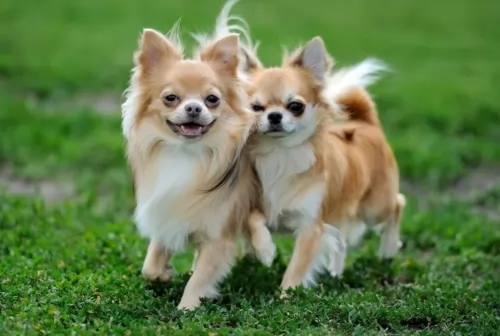 The pint-sized long-haired Chihuahua isn’t going to take up too much of your time in terms of grooming. Make sure you brush him at least twice a week to ensure his long hair doesn’t tangle. Small dogs are prone to dental problems, so try and brush his teeth at least 2 or 3 times a week with special doggy toothbrush- and toothpaste.
The pint-sized long-haired Chihuahua isn’t going to take up too much of your time in terms of grooming. Make sure you brush him at least twice a week to ensure his long hair doesn’t tangle. Small dogs are prone to dental problems, so try and brush his teeth at least 2 or 3 times a week with special doggy toothbrush- and toothpaste.
Take your puppy Chihuahua to the vet for his regular vaccinations to prevent him getting dangerous illnesses.
Feed him a high quality dog food. He is a high energy dog so buy high quality food that caters for small, lively dogs. Try and feed him such home made food from time to time. Remember that with small dogs, high-salt diets can contribute to kidney problems.
Never overfeed your Chihuahua as obesity opens up major health problems in Chihuahuas.
 Puppies will need 4 small meals a day, but by 8 weeks your Schnorkie will be ready to move onto dry dog food. As he grows into an adult you will cut the meals down to two a day.
Puppies will need 4 small meals a day, but by 8 weeks your Schnorkie will be ready to move onto dry dog food. As he grows into an adult you will cut the meals down to two a day.
The best commercially manufactured dry dog food is able to meet your dogs nutritional needs and it’s super convenient too. It can be a good idea to feed your pet some home-made food too. Twice a week will be sufficient to add in this home-made food - boiled chicken, brown rice or pasta, sweet potatoes, carrots and spinach will be excellent for him and his digestion and be a tasty treat for him. You can simply chop it up and add it to the dry kibble. Some raw meat occasionally can help to ward off nasty skin ailments. Make sure that your Schnorkie has a constant supply of cool fresh water.
Schnauzers and Yorkies both have high maintenance coats and your Schnorkie will also require regular brushing, though he doesn’t shed much. Some people prefer to hand their dogs in and have them professionally groomed.
Just because a Schnorkie is a little dog, doesn’t mean he doesn’t need exercise. You don’t want a small dog like this getting obese and unfit. Take him for walks and give him some ball games.